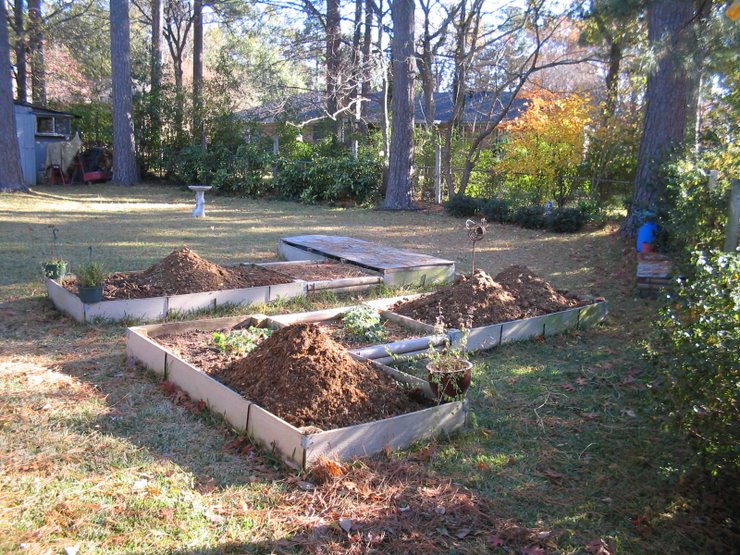Note: I promised this would be about the harvest, but we ain't ready for that yet.
If a worm will thrive on paper...or cardboard...or horse manure...or [i]any[/i] organic materials, shouldn't we suppose that that worm will do better on even more organic materials....especially those we prefer or think they'll prefer?
Well,.....no.
We produce pretty elaborate menus for them, and fret about their diets, and the truth is they do just fine...with, or without us overdoing it all.
We tend to overdo most everything regarding composting worms that we've imprisoned in bins we perceived to be worm worthy, and although I firmly believe they adapt very well, we might ought not expect them to adapt as readily to what we humans assume to be what's best for them.
We've all seen them hanging out in the undesirable, murky, too-wet parts of the bin acting for all the world like they're having the time of their lives. I think they are.
Next: I ain't making any promises this time.
Chuckiebtoo
Wednesday, March 7, 2007
Sunday, March 4, 2007
Vermicompost? Worm poop? Something inbetween?
Since everyone has gotten this far without any problems, I guess the lack of questions is understandable. So, we'll move on to other stuff.
Let's talk about vermicompost.
Well-processed vermicompost is mostly worm casting (poop). The less processed vermicompost is, the more it is worm food waiting to be turned into worm poop.
Using this reasoning, it's reasonable to believe that if the material your worms are residing in is not completely worm poop, then it's partly delicious worm food. That's why you don't have to feed them a nice fresh piece of lettuce or other stuff every few days.
Human nature being what it is though, people...being human...tend to feed them babies when the bin looks to be foodless in human terms.
Oh, worms will show preferences for some foods...like pumpkin, and bananas, and cantaloupe...but that's just the humanity coming out in them that you've installed in them.
Let 'em eat all the compost in the bin. That's what makes good vermicastings.
The cups in the pic below have well-finished vermicompost (left cup), and not-so-well finished VC (right cup).
next: harvest time?
Chuckiebtoo
Let's talk about vermicompost.
Well-processed vermicompost is mostly worm casting (poop). The less processed vermicompost is, the more it is worm food waiting to be turned into worm poop.
Using this reasoning, it's reasonable to believe that if the material your worms are residing in is not completely worm poop, then it's partly delicious worm food. That's why you don't have to feed them a nice fresh piece of lettuce or other stuff every few days.
Human nature being what it is though, people...being human...tend to feed them babies when the bin looks to be foodless in human terms.
Oh, worms will show preferences for some foods...like pumpkin, and bananas, and cantaloupe...but that's just the humanity coming out in them that you've installed in them.
Let 'em eat all the compost in the bin. That's what makes good vermicastings.
The cups in the pic below have well-finished vermicompost (left cup), and not-so-well finished VC (right cup).

next: harvest time?
Chuckiebtoo
Thursday, March 1, 2007
OK, your worm bin is developing rigor mortis...no problem
In spite of all you read, and the amount of effort you've put into this effort, you...and it, the bin, are failing miserably. Well, now's the time to put things right.
Once again, as always, I'll assume you have a plastic tote bin, and I'll assume you've overfed and over-moisturized unless you've got some robins in there because that's about all, except heat, that'll kill 'em.
If your bin has the worst, most horrible odor you've ever smelled, that would be the stench of dead worms. It is unforgettable, awesome, and will make you discard the entire contents of that bin...which is good because that's what I was gonna tell you.
After you've dumped the contents into someone else's yard at least a block away, rinse out the bin and start over. Re-read all the preceding threads here and pay better attention to the parts about moisture and excess food.
But...,if the bin isn't as bad as all that, leave the lid off long enough for it to dry out. You'll probably need to remove all the upper bedding and uneaten foodstuff and likely stir it up a little to help dry it out.
When it's time, replace the newspaper(?) upper bedding with DRY stuff. Don't feed anything for one week.
It'll come back to life with a little patience. It'll stay happy with a little moderation, and diversity.
Chuckiebtoo
Moderation, Diversity, Patience
next: I'll answer your questions.
Once again, as always, I'll assume you have a plastic tote bin, and I'll assume you've overfed and over-moisturized unless you've got some robins in there because that's about all, except heat, that'll kill 'em.
If your bin has the worst, most horrible odor you've ever smelled, that would be the stench of dead worms. It is unforgettable, awesome, and will make you discard the entire contents of that bin...which is good because that's what I was gonna tell you.
After you've dumped the contents into someone else's yard at least a block away, rinse out the bin and start over. Re-read all the preceding threads here and pay better attention to the parts about moisture and excess food.
But...,if the bin isn't as bad as all that, leave the lid off long enough for it to dry out. You'll probably need to remove all the upper bedding and uneaten foodstuff and likely stir it up a little to help dry it out.
When it's time, replace the newspaper(?) upper bedding with DRY stuff. Don't feed anything for one week.
It'll come back to life with a little patience. It'll stay happy with a little moderation, and diversity.
Chuckiebtoo
Moderation, Diversity, Patience
next: I'll answer your questions.
Subscribe to:
Comments (Atom)

